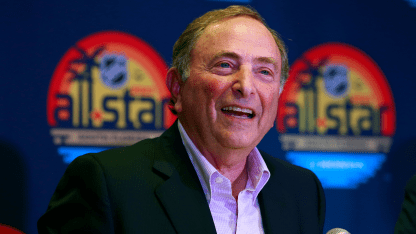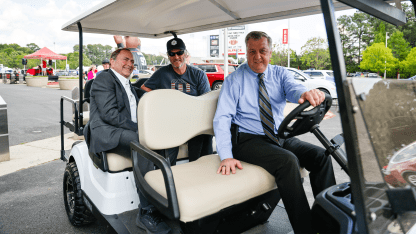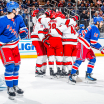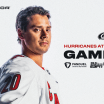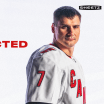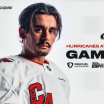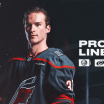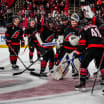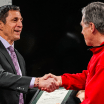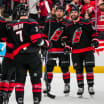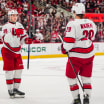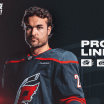Scott Burnside: I have talked to lots of people about the move from Hartford and how that unfolded but I'm curious when you think of it, about that process, and it happened so quickly relatively speaking. When you think of the move of the Whalers to Carolina, Gary what comes to mind for you? What are some of the things that you think about when you reflect on what was a pretty tumultuous time?
Gary Bettman: Not as tumultuous as you'd think. I'm not sure what versions of the story you've heard but it became pretty cut and dried. Having said that, I know we had great fans in Hartford and I know the City of Hartford went through some difficult times. But at the end of the day, while it took a little time for the team to get established in North Carolina, what's going on there particularly now is fantastic. Tom Dundon, succeeding Pete Karmanos, has done a great job of moving the franchise to an all-time high level, whether it's fan interaction, whether it's the performance of the team on the ice, or the support that's now being injected in the business community. And it's great to see. The Hurricanes have terrific fans who have created their own traditions and culture and the team has become an even more important part of the community.
Burnside: I don't think there's any doubt of any of that. I think it's probably fair to say that there may be a fair portion of that fan base that may not understand the history of the team and the hard work that was put in all those years ago. And I wonder when you think back to those first two years in Greensboro and then the move into Raleigh, were there moments where you were concerned? When you think back to those early days in North Carolina what was that like for you as the Commissioner?
Bettman: Transition can be difficult. And particularly when people look at it as a snapshot as opposed to a full-length movie. I remember going to games in Greensboro. And that was challenging because it was a long distance to travel for a team that people, and for a sport that people weren't all that familiar with. But the market, I always believed. The Triangle has always in my view been a dynamic growing market that had no other professional teams. And the market from a sports rooting standpoint had always been fragmented among the colleges. The Hurricanes were the one thing that, from a sporting standpoint, could bring The Triangle together. And that's what happened, actually.
Burnside: I talked to Jim Rutherford not too long ago about how important the league was in helping to lay the foundation in Raleigh and that the business community from the get-go in the Raleigh area was really on board and was really important to help once they got into that building to make things work. I wonder when you think about those kinds of relationships, some of which still exist today, what was that like for you to see come together?
Bettman: Knowing the commitment of the Centennial Authority and the business community, again, this is a vibrant market. Always has been. It's been a growing market for all 25 years and it's a great sports market, but it was all collegiate. So this was for us a great opportunity. Part of it goes back to the old school thinking about franchises in - I hate the term - "non-traditional markets" - I never believed there was such a thing. There were warmer climates but everybody develops their own tradition and I believed that over time the hockey in The Triangle not only would work but it would thrive, and I think Tom Dundon has been the icing on that cake in terms of really making it a reality at unprecedented levels.
Burnside: I've spent a lot of time around that team and spent a lot of time around Tom and watching him operate. He marches to his own beat and I wonder what it's been like for you to watch what has happened under his ownership since early 2018 in terms of the presence and the profile of the team and all those kinds of things? What's your relationship like with Tom?
Bettman: Tom and I have a very good, strong relationship. We communicate regularly. Your characterization, and so I don't want it to be mine, your characterization that he marches to his own beat, even if that's the case, so what? I think that's great. Particularly in a growing community, particularly where millennials and Gen-Zs are becoming more significant portions of our fan base, it's great that he does his own thing and you see the results.

